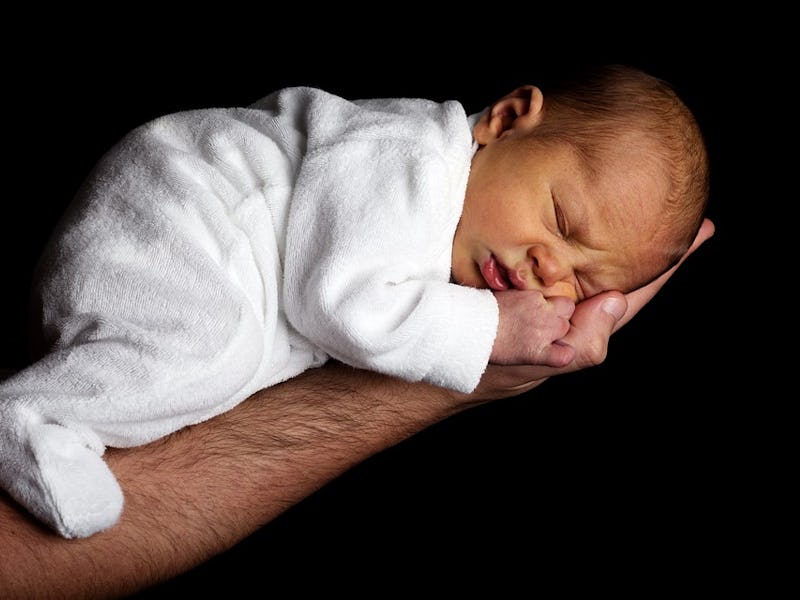UK Bioethicists Explain How Designer Babies Could Be "Morally Permissible"
Genetic manipulation doesn't have to be unethical.

The Nuffield Council on Bioethics, one of the UK’s leading advisory agencies, released a landmark report on Tuesday calling for a shift in attitudes toward genetic editing. A long-standing sci-fi trope, the prospect of manipulating the genome of a human embryo has led to fears of “designer babies” — the idea that parents might be able to choose their children’s traits and in doing so influence human evolution. But through a series of dystopian scenarios, the researchers behind the report entertain the possibility that human genetic manipulation can be done in a way that’s ethically and morally permissible.
The report, the product of a year of study, has the potential to serve as a foundational document as geneticists and bioethicists continue to debate this issue if it doesn’t raise too much controversy first. Currently, manipulating human DNA and changing the germline — the DNA of an embryo or an unfertilized sperm or egg, which would be passed down generation to generation — does not happen anywhere in the world outside of the laboratory. But the Nuffield working group argues that, with more research and public debate, we could create a world where doing so can be done responsibly.
“It is our view that genome editing is not morally unacceptable in itself,” said Karen Yeung, Ph.D. chair of the Nuffield working group and professor of law, ethics and informatics at the University of Birmingham, The Guardian reports. “There is no reason to rule it out in principle.”
Manipulating germline DNA means the changes would be passed on from generation to generation.
Preventing the Formation of a ‘Genetic Underclass’
Referring to manipulation of the human germline as “the frontier,” the team uses a series of science fiction thought experiments to think about how editing the human germline would reshape the social order. Rather than raise fears about these changes, the team imagines how humans might mitigate them. One of their thought experiments is reminiscent of a concept introduced in the 1997 film Gattaca: the development of a “genetic underclass.”
Concerns have long existed that genetic technologies could lead to the emergence of a ‘genetic underclass’ … In a number of generations, it is imaginable that a schism might arise between the ‘gene rich’ and ‘gene poor’, which could have the effect of undermining ‘genetic solidarity’ as a basis for moral treatment of others.
The researchers use this far-fetched scenario to think about how we might potentially legislate for the equal treatment of those born with a manipulated genome. In some important documents in the current body of legislation on human gene editing, the human genome is framed as a foundational pillar of humanity. This could be problematic, the team writes, arguing that the thinking around what makes us human is in need of a reassessment.
Redefining What’s Human
Do genes make the human? Right now, we’re leaning toward yes: Article 1 of the 1997 Universal Declaration on the Human Genome and Human Rights of Gene Editing, an important document currently used to build legislation around gene editing, reads:
The human genome underlies the fundamental unity of all members of the human family, as well as the recognition of their inherent dignity and diversity. In a symbolic sense, it is the heritage of humanity.
This document rests on the idea that a shared genome is, biologically speaking, one of the features that unites the human family. While it acknowledges that the human genome is always shifting in relation to the environment, the fear it raises is that some might misinterpret the idea of a “wild type” or un-manipulated human genome as a status symbol that could be used to effectively ostracize some from the human family — much like “purebloods” are considered by some as higher-status wizards in the Harry Potter series.
This concept, called “genetic essentialism,” has been addressed across the world as a potential misuse of genetic research; one Australian report described it as “a reductionist view of human beings as essentially consisting of their genes, with human worth describable in the language of genetics.”
The Nuffield report entertains this fear and others like it in an effort to head them off at the pass. Tucked into an unassuming paragraph is the Nuffield working group’s conclusion that avoiding these fraught possibilities means rethinking our definition of humanity.
As early as 1913, science fiction authors have stressed about the social implications of genetic editing. Aldous Huxley wrote about it in his book, Brave New World.
“We have concluded that although particular interventions engage and may violate human rights, they do not threaten the basis of human rights as such,” they write. “This is because entitlement to human rights does not depend on the possession of a ‘human genome’, even if such a thing could be described.”
The authors make it clear that the emergence of a “genetic underclass” is well outside the boundaries of our current genome editing technology. These are the scenarios of science fiction — the worst-case application of existing scientific technology. But, as this report shows, these scenarios serve as our canaries in the coal mine, pointing out fatal flaws in genome-editing regulation before it’s too late.